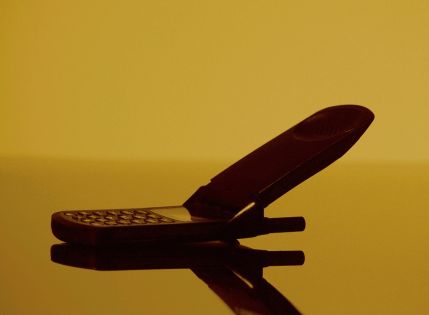Student Voices
How a simple flip phone helped a BU student reclaim their time and attention.
Earlier this year, the U.S. surgeon general called for a warning label on social media platforms. Phrases like “brain rot” highlight a growing cultural understanding that endless scrolling isn’t cool or good for us anymore. However, trying to “tough it out” and rely on self-control around smartphones can be incredibly challenging—especially when an entire industry is pouring money into keeping us scrolling longer. The solution isn’t carrying the addictive device in our pocket and telling ourselves, “Just don’t.” For me, the answer was to cut off access entirely.
I noticed my emotional well-being decline significantly due to social media overuse—not to mention the countless hours of sleep and focus I lost. Despite valiant efforts to reduce my screen time, such as setting screen time limits with passwords I didn’t know, deleting all my apps, or even disabling accounts, I couldn’t escape the endless scroll. Sound familiar? I’d get fed up with being online, delete all my social apps, and then find myself refreshing Goodreads or Gmail—the least scrollable apps imaginable—just to fill the void. A few days later, I’d cave and redownload Instagram, Twitter, or whatever app was the month’s flavor.

Two months ago, I decided to let it all go. Inspired by a friend and plenty of research, I purchased a Nokia 2760—a flip phone that cost just twenty dollars.
At first (and sometimes still), I carried my flip phone and iPhone. I took the T to Harvard on my first solo day with just the flip phone. Instead of drowning in the piercing static of endless social media content, I listened to the bursts of life on the Red Line. Crossing the Longfellow Bridge, I watched the city breathe across the water—it was one of the most beautiful sights I’d ever noticed. I’d never noticed it before because I was always on my phone. There’s so much life in this city, so much to see. I wondered if this is what it felt like in the ’90s: thinking, letting random thoughts wander, and feeling curious in a way I’d forgotten. Now, I feel bored and attentive all at once—and I giggle at the funny, everyday moments I used to miss.
Being off the grid means relying on others: asking for directions, calling a friend to check Google Maps when you’re lost, or seeking help in unexpected ways. On a BU bus route I’d never taken, I asked a stranger, “Is this going to West?” since I didn’t have Terrier Transit. We ended up chatting for a bit during the ride.

At a Student Health Ambassador meeting, I had to borrow laptops from two group members because I couldn’t contribute to a project without my phone or computer—neither of which I had with me. (Ironically, our stress management lesson mentioned how pro-social interactions like these can reduce stress.) Despite these minor inconveniences, I’ve managed just fine in class and with homework, even without a phone.
Getting off our smartphones can feel terrifying. When we constantly suppress our thoughts and feelings with content 24/7, they grow more intimidating the longer we avoid them. Sometimes, life is rough, and we need to get through the day with whatever makes it easier—and that’s okay. But often, I reach for my phone simply because I’ve forgotten how to sit with even a little discomfort. Smartphones promise instant relief from uncomfortable feelings while endlessly profiting from our data and attention. Yet, I’ve found that practicing mindfulness, radical acceptance, and simply allowing my thoughts to surface makes them far less frightening than suppressing them ever did.
In a workshop with Melissa Paz, the Assistant Director of Mental Health Promotion at BU Student Health Services (SHS), I’ve been learning mindfulness techniques—and having a flip phone has been a surprisingly helpful tool. By stepping away from my smartphone, I’m forcing myself to be more aware and present. If you’re struggling with presence or slowing down, I highly recommend trying a flip phone or setting screen limits with a password only your best friend knows.
If you’re curious about mindfulness, SHS offers various services, like Mindfulness Workshops and Mindful Movement Yoga. You could also download Headspace (yes, on your smartphone or computer), join BU Zen, or take a yoga class at FitRec. I’m not saying we should all toss our phones, but investing time to unplug and care for our mental and physical health could make a big difference as a student body. Who knows—you might even enjoy it.









